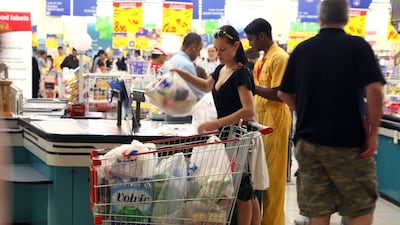Even before Cop28 made its way to our shores, I have been trying to lead a more sustainable lifestyle – yet I often find myself confused as to how to personally approach the climate crisis.
Now that the conference has drawn to a close – and offered so many valuable insights – I am determined to revisit the way I live (and shop), and re-examine why it is that I often struggle to put my best eco-friendly foot forward.
Here are three issues I face.
1. Being eco-friendly can be an expensive proposition

Having to pay double the price for sustainable products is not a lifestyle I can adapt to in my 20s, and it frustrates me.
I am happy to be proved wrong, but I believe sustainable products fit better into a luxury-lifestyle mould rather than a practical one accessible to the majority.
The cost of saving the environment often feels high, while the price of damaging it is low.
As the World Bank statistics reviewed, as of 2022 middle income countries were home to 75 per cent of the world’s population and 62 per cent of those below the poverty line. This puts the middle and lower class at the forefront of the crisis solution as they make up more than half the population.
Personally speaking, as a pescatarian trying to maintain a sustainable lifestyle comes at a cost, as opting for ethically sourced seafood and organic produce often means a much higher grocery bill.
A pound of wild-caught salmon can range from $15 to $20, which is nearly double the price of conventionally farmed options. Same goes for eggs, chicken and even organic fruit and veg.
The climate effect of fashion, too, is much talked about. And while I am appalled to know the effects of fast fashion, I can’t help but turn to the high street when I need (or, admittedly, want) to wear something new.
Would a jacket from Louis Vuitton last me longer than one from Next, and so make the investment worthwhile in the end – both to planet and pocket? Absolutely.
Can I justify dropping Dh5,000 on an LV jacket at the moment? Absolutely not.
2. Being sustainable can be a sheer inconvenience

Grocery shop visits confound me the most. Having to find a substitute to products that are not wrapped in plastic feels nearly impossible.
While choosing reusable products contributes to saving the environment in the long run, it also comes with a lot of extra work: carrying bags, cutlery and water bottles around all the time.
This is not practical when one is always on the run.
Guilt does kick in when I drink out of a plastic straw or a plastic cup, but there are times I forget – or, admittedly feel too lazy – to not go the extra mile and clean my reusable water bottle daily.
Having said that, there are many restaurants and cafes that continue to serve plastic bottles, cutlery and, perhaps most unnecessarily of all, single-use straws.
Although I’d rather drink out of a straw than from a cup used by hundreds of people, if it were not available at the restaurant, I would have dealt with it.
3. Changing the world requires breaking old habits
Finally, I find it difficult to break old habits in a busy world.
As a 2021 study published in the British Journal of Health Psychology stated, people need an average of 59 days to successfully form a new habit.
When I visit my local grocery shop weekly, my brain is wired to pick up the usual items I always buy.
What captures my attention most is the items on sale placed at the forefront aisles rather than the biodegradable products often relegated to the back.
But I am trying to change my ways, especially in line with the UAE’s recent decision to impose a charge on plastic bags.
Earlier, unthinkingly, I might have placed but one or two items, no matter how small, in their own plastic bag, simply because it was available for me to do so.
Now, like so many shoppers around me, I try to place items directly in the shopping trolley to unload them directly into the car.
Although I find it challenging to change old habits, if there’s one takeaway from Cop28 it is that living sustainably should no longer be a choice, no matter how inconvenient.
Next on my list? An electric vehicle, which is not only better for the planet, but also – conveniently – for the (faux leather) purse.

